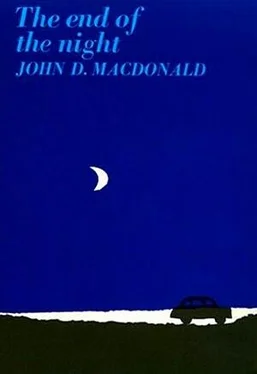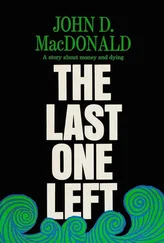“Hey, they’re gone!” he said.
“Who’s gone, stupid?”
“The people in four.”
“They said they’d go, din they?”
“Yes, but...”
“Go to Schiller’s, see can you buy a box of sugar cones off that robber. I’m almost outa cones here.”
“Okay! Okay!”
“Now who’s yelling? Here’s two dollars. Don’t stop for a beer.”
DEATH HOUSE DIARY
This morning I have been conjecturing about how long it will take me to be totally gone. By that I mean more than death. I mean the amount of time before no one will give me one single specific thought, no matter how fleeting. In a sense this is a discussion of limited immortality, a very contradictory phrase. Immortality is an absolute, not subject to limitation.
The old man and Ernie will remember me, of course. I think she’ll last longer than he will. She’s pretty tough. She’s forty-seven now, and I’ll give her the benefit of the doubt and say she’ll live to be ninety. That will take me a little past the year two thousand. That salesman named Horace said his youngest was eighteen months. I can assume his wife will teach his kids to use our names as curse words, and I will assume that the youngest will remember my name, and live to be ninety, so that extends awareness of Kirby Palmer Stassen up to 2050, approximately. I can’t stretch it and extend it to the salesman’s grandchildren. I suspect it won’t mean a damn thing to them. They will know vaguely that their grandfather was murdered, but that’s all. Taking it to 2050 takes it well beyond the span of anyone I know, of course.
Now consider physical things. Matter cannot be destroyed. It is a curious thing to realize that there is still in existence, somewhere, every cinder I have ever had in my eye, every paring of fingernail and toenail, every stone that has bruised me. My physical being will continue to exist. It will be tucked out of sight in Memorial Grove at Huntstown. It will be a very, very private funeral, I am sure, with no brave stirring words spoken. There will be a marker, of course. Ernie will insist upon that. Something very small, but it will bear the name Kirby Palmer Stassen. I could cheat on this game and say the marble will last a thousand years, but if the name means nothing to anyone who reads it, then I am truly and totally gone. The scandal will stay alive in Huntstown. I think I can assume that there will always be old ladies who recount the black deeds of past generations, so I will stretch a little and say that in 2100 they will still retain some dry morsel of information about this.
As far as possessions are concerned, I imagine Ernie and the old man will get rid of mine as quickly and quietly as possible, diverting them to the anonymity of the village dump and the Salvation Army. Ernie will save a few things, I imagine. Baby shoes. Pictures. But she won’t dare look at them when the old man is around.
The third aspect of this conditional immortality is a chancy thing. The crimes and the way they were done and the trial have, I suppose, some meaning to sociologists. They stimulate themselves with case histories. I shall appear, I am sure, in some laborious texts. I will doubtless be called K. S. or Kirby S. or perhaps simply S. But in this game I can count that, because they will be discussing me. This journal I am writing, should it get into the right hands, might possibly cue a very exhaustive study. Yet, in most cases, these books die when the professor who insists his students buy them dies. On that basis I can assume a half-life only until — say — the year 2000. But there is an imponderable here which cannot be measured. It is possible that my case might be written up by someone capable of turning out a classic. If it is very, very good, if it is a work of art, it could well last three hundred years. I would say that would be the outside limit, due to the continuing change in the language. So genius is my only hope of outliving gossip. This could take me up to 2260, a very science-fictiony sort of date. And on one day in that year the last man will read of me, of a crime three hundred years old, and discard the last book, and then I will be gone as completely as though I had never lived at all. The final ultimate rest.
Isn’t three hundred years a vast span of time? It is one ten millionth of the estimated life span of the planet to date. Or it is the same ratio as is three seconds to one full year. And on the same scale, my life span has been one quarter of one second.
Riker Deems Owen came in at the end of the morning and did his usual splendid job of boring me wretched. At least, this time, he spared me the presence of the nubile, self-conscious Miss Slayter. They took me down to the carefully engineered little conference room to meet with him. We talk into microphones and are separated by two thicknesses of bulletproof glass. He seems quite unaware of having made a thorough ass of himself in court. He is a pompous, pretentious, slack-witted little man. He spoke today of the complexity of appealing this case, of his hopes of obtaining a stay of execution. I suspect constant pressure by my male parent. It is useless, of course. Riker Owen knows it and I know it, but he beams at me in a glassy way in an effort, I suppose, to build up my morale. One can only exist in places like this when all hope is gone. Hope is an ennervating weakness that makes adjustment impossible.
He said again that they would like to see me, Ernie and the old man, and that it could be arranged, but once again I told him that it was not my pleasure to see them. It could not possibly do any of us any good. He asked if I would write, at least. I told him to tell them that I am well and in reasonably good spirits, that I am given anything within reason that I ask for. I told him that I am writing a record of my experiences and that I have been assured that it will be passed along to them after I have been put to death.
Right here is as good a time as any to insert my personal note to you, Ernie and Dad. I do not expect you to understand all this I am writing. I do not expect you to try to understand me. I have very little understanding of myself. You could read it and save it, and one day you might find a very wise man, someone you can trust, who will read it and tell you why all this happened, and tell you that in most basic ways I am no different from the sons of your friends. All of them are, potentially, exactly like me. They have been favored by the enduring of lesser crises.
Let me say also that I am not trying to wound you through frankness. Were I to write only what I suspect you might wish to read, there would be no point in writing this at all.
I had carried my account as far as Chubby’s Grill on Route 90 on the outskirts of Del Rio. I have devoted a lot of time and space to the Kathy Keats episode. It is not an episode, or an aside, or a digression. What happened there, to her and the relationship between us, is close to the very heart of all that came after.
It was a Sunday afternoon. Sandy Golden had jeered at me, but not in a way that made me angry. It was in the tone of his voice, a sort of lift of nervous excitement.
I smiled over toward the dingy corner where the voice had come from, then bought a bottle of cold ale at the bar and carried it over, ale in one hand, suitcase in the other.
“Every college boy likes to be recognized immediately as a college boy,” he sad. “It’s like scratching a dog behind the ear. Have you been dude ranching, man? You aren’t wearing your Marshal Dillon threads.”
“It’s a new kind of ranch kick, man,” I told him. “Nobody wears anything. They kept us on health food. You had to carry your own horse.”
“Sit, college boy,” he said. “Meet Nan and Shack. What’s your name?”
Читать дальше







![Джон Макдональд - The Hunted [Short Story]](/books/433679/dzhon-makdonald-the-hunted-short-story-thumb.webp)


